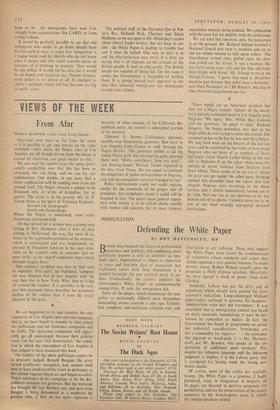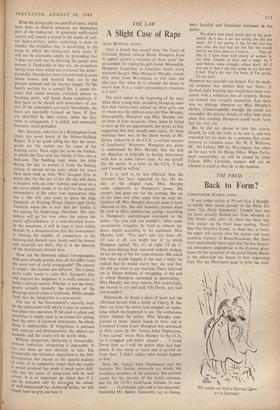IMMIGRATION
Defending the White Paper
By ROY HATTERSLEY, MP
BURIED deep beneath the layers of professional assurance and synthetic self-confidence, most politicians possess a skin as sensitive as any- body else's. Appreciation is almost as important as votes and fourteen days of accusation that traditional values have been abandoned is a painful fortnight for any political party to en- dure. Undoubtedly, the country supports the Government's White Paper on commonwealth immigration. If only the newspapers did.
Some of the papers which denounced the new policy as profoundly illiberal were themselves demanding sterner controls a year ago. Unjusti- fied complaint and malicious criticism only add
frustration to our suffering. Those who support the White Paper have found the condemnation of columnists whose standards and values they usually applaud a very painful business. To make matters worse, Robert Pitman actually gave the proposals a Daily Express accolade. Mercifully, we were spared a word of praise from John Gordon.
Suddenly, Labour has got the dirty end of arguments which should have proved the Gov- ernment's radicalism. Long-submerged Midland industrialists surfaced to provoke the headline: `IMMIGRATION CURB MAY HIT FOUNDRIES.' It Was concluded that as immigration control was based on shaky economic foundations, it must be but- tressed by cowardice or malice. In fact, the Government has based its programmemn social, not industrial, considerations. Immigrants are not a commodity for injection o the economy, like pig-iron or wood-pulp. It is Mr. Thorney- croft, not Mr. Bowden, who speaks of 'the im- portation of additional male workers.' Yet, despite his inhuman language and the inhuman judgment it implies, it is the Labour party that is castigated for having made the wrong eco- nomic choice.
Of course, most of the critics are woefully wrong. The White Paper is a genuine, if badlY presented, essay in integration. A majority of its pages are devoted to positive proposals for assimilation and for the preservation of the scarce amenities in the broken-down areas in which the immigrants have settled. Even the paragraphs on control of entry, which have been so bitterly attacked, are themselves part of the endeavour. A genuinely multi-racial society will remain a dream in the minds of radi- cal leader-writers, unless something is done to combat the prejudice that is developing in the areas to which the immigrants have come. It will not be overcome simply by pretending that it does not exist nor by berating the people who possess it. Deplorable as they are, the prejudices spring from fears which are irrational but under- standable. Immigrants have concentrated in areas where houses and hospital beds are in the greatest demand and the shortest supply. To the family waiting for a council flat, it seems ob- vious that social services, stretched almost to breaking point, will break down completely if they have to be shared with newcomers of any sort. If the newcomers are easily identifiable, the fears are inevitably focused on them. If they are identified by their colour, when the fear turns to antagonism, it is called, and eventually becomes, racial prejudice.
Mrs. Seargent, who lives in a Birmingham back street, has never heard of the Milner-Holland Report. It is no good telling her that the immi- grants are 'the victims not the cause of the housing crisis.' Each night she turns the kitchen, in which she lives with her family of five, into a bedroom. The bedding, kept under the table during the day to protect it from the leaking ceiling, is spread across sofas which for years have been used as beds. Mrs.-Seargent lives in terror that for the rest of her life she will share a lavatory with six other families and cook on a gas stove which stands in the hall for the greater convenience of the other four housewives who use it. She will only come to share the high standards of Printing House Square and Great Turnstile when she is sure that her family is not paying for leader-page liberalism. Her pre- judices will go for ever when she enjoys the social self-confidence of a semi-detached house. In the meantime, it will be kept at least within bounds by a demonstration that the Government is limiting the number of competitors in the housing and obstacle race. Surely until the houses and hospitals are built, that is in the interests of the immigrants already here.
How, ask the thousand radical correspondents With pens already poised, does all this differ from the worst sort of racial propaganda? The answer is simple: the motives are different. The Labour Party really wants to calm Mrs. Seargent's fear and improve her judgment. It is really anxious to build a tolerant society. Whether or not the immi- grants actually intensify the problem of the decaying central areas is irrelevant. Whilst people think they do, integration is a non-starter.
The test of the Government's sincerity must be the enthusiasm with which it puts its assimila- tion plans into operation. If thd need to adjust and assimilate is simply used as an excuse for cutting back the entry of coloured immigrants, the whole thing is indefensible. If integration is pursued with courage and determination, the objects are laudable and the results will be worth while.
Without integration, limitation is inexcusable; Without limitation, integration is impossible. It has not been an easy decision to take. The honourable, but mistaken, opposition to the 1961 Immigration Act (based on the squalid motives 9T some of its supporters rather than the results It would produce) has made it much more diffi- cult, but the cause of integration will be well served. It is so important an object that if it Can be achieved only by attracting the odium of well-intentioned but cloistered critics, we will sant* have to grin and bear it.































 Previous page
Previous page